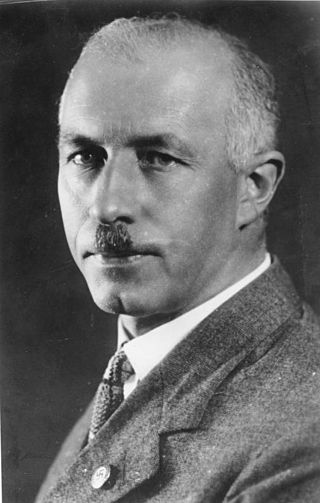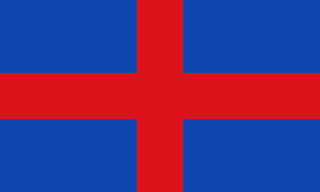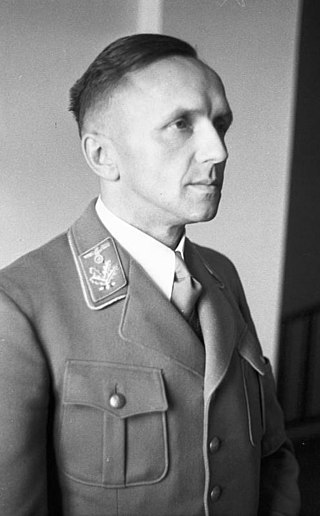
The Nazi Party, officially the National Socialist German Workers' Party, was a far-right political party in Germany active between 1920 and 1945 that created and supported the ideology of Nazism. Its precursor, the German Workers' Party, existed from 1919 to 1920. The Nazi Party emerged from the extremist German nationalist, racist and populist Freikorps paramilitary culture, which fought against communist uprisings in post–World War I Germany. The party was created to draw workers away from communism and into völkisch nationalism. Initially, Nazi political strategy focused on anti–big business, anti-bourgeois, and anti-capitalist rhetoric; it was later downplayed to gain the support of business leaders. By the 1930s, the party's main focus shifted to antisemitic and anti-Marxist themes. The party had little popular support until the Great Depression, when worsening living standards and widespread unemployment drove Germans into political extremism.

The Nuremberg rallies were a series of celebratory events coordinated by the Nazi Party in Germany. The first Nazi Nuremberg rally took place in 1923. This rally was not particularly large and did not have much impact; however, as the party grew in size, the rallies became more elaborate and featured larger crowds. They played a seminal role in Nazi propaganda events, conveying a unified and strong Germany under Nazi control. The rallies became a national event once Adolf Hitler rose to power in 1933, when they became annual occurrences. Once the Nazi dictatorship was firmly established, the party's propagandists began filming them for a national and international audience. Nazi filmmaker Leni Riefenstahl produced some of her best known work including Triumph of the Will (1934) and The Victory of Faith (1933), both filmed at the Nazi party rally grounds near Nuremberg. The party's 1938 Nuremberg rally celebrated the Anschluss that occurred earlier that year. The 1939 scheduled rally was cancelled just before Germany's invasion of Poland and the Nazi regime never held another one due to the prioritization of Germany's efforts in the Second World War.

Gottfried Feder was a German civil engineer, a self-taught economist, and one of the early key members of the Nazi Party and its economic theoretician. One of his lectures, delivered on 12 September 1919, drew Adolf Hitler into the party.

Gregor Strasser was a German politician and early leader of the Nazi Party. Along with his younger brother Otto, he was a leading member of the party's left-wing faction, which brought them into conflict with the dominant faction led by Adolf Hitler, resulting in his murder in 1934. The brothers' strand of the Nazi ideology is known as Strasserism.
The National Socialist Program, also known as the 25-point Program or the 25-point Plan, was the party program of the National Socialist German Workers' Party. Adolf Hitler announced the party's program on 24 February 1920 before approximately 2,000 people in the Munich Festival of the Hofbräuhaus and within the program was written "The leaders of the Party swear to go straight forward, if necessary to sacrifice their lives in securing fulfilment of the foregoing points" and declared the program unalterable. The National Socialist Program originated at a DAP congress in Vienna, then was taken to Munich, by the civil engineer and theorist Rudolf Jung, who having explicitly supported Hitler had been expelled from Czechoslovakia because of his political agitation.
This is a list of words, terms, concepts and slogans of Nazi Germany used in the historiography covering the Nazi regime. Some words were coined by Adolf Hitler and other Nazi Party members. Other words and concepts were borrowed and appropriated, and other terms were already in use during the Weimar Republic. Finally, some are taken from Germany's cultural tradition.
Reichsleiter was the second-highest political rank in the Nazi Party (NSDAP), subordinate only to the office of Führer. Reichsleiter also functioned as a paramilitary rank within the NSDAP and was the highest rank attainable in any Nazi organisation.

The Nazi Party/Foreign Organization was a branch of the Nazi Party and the 43rd and only non-territorial Gau ("region") of the Party. In German, the organization is referred to as NSDAP/AO, "AO" being the abbreviation of the German compound word Auslands-Organisation. Although Auslands-Organisation would be correctly written as one word, the Nazis chose an obsolete spelling with a hyphen.

The Office of Racial Policy was a department of the Nazi Party (NSDAP) that was founded for "unifying and supervising all indoctrination and propaganda work in the field of population and racial politics". It began in 1933 as the Nazi Party Office for Enlightenment on Population Policy and Racial Welfare. By 1935, it had been renamed to the Nazi Party Office of Racial Policy.
Friends of New Germany, sometimes called Friends of the New Germany, was an organization founded in the United States by German immigrants to support Nazism and the Third Reich.

The Free State of Oldenburg was a federated state that existed during the Weimar Republic and Nazi Germany. It was established in 1918 following the abdication of the Grand Duke Frederick Augustus II of the Grand Duchy of Oldenburg after the German Revolution and was abolished by the Allies following the Second World War.
The NSDAP/AO is an American neo-Nazi organization. It was founded in 1972 by United States citizen Gary Rex Lauck in Fairbury, Nebraska. The organization's name stands for "NSDAP Aufbau- und Auslandsorganisation".

Franz-Josef Röder was a German politician of the CDU and from 1959 to 1979 Minister President of Saarland. He had been a member of the Nazi Party from 1933 to 1945.

The Gau Munich–Upper Bavaria was an administrative division of Nazi Germany in Upper Bavaria from 1933 to 1945. From 1930 to 1933, it was the regional subdivision of the Nazi Party in that area.
The NSDAP Office of Colonial Policy was a Nazi Party office formed in 1934. Its stated objective was to formulate plans for the re-taking of the former German colonies. The office lost much of its meaning after the start of World War II, and was dissolved after the reversal of Nazi Germany's military victories in 1943.

Amt Rosenberg was an official body for cultural policy and surveillance within the Nazi party, headed by Alfred Rosenberg. It was established in 1934 under the name of Dienststelle Rosenberg, with offices at Margarethenstraße 17 in Berlin, to the west of Potsdamer Platz. Due to the long official name of Rosenberg's function, Beauftragter des Führers für die gesamte geistige und weltanschauliche Erziehung der NSDAP, the short description Reichsüberwachungsamt "Reich surveillance office" was used alongside, also shortened simply to Überwachungsamt "surveillance office".

The NSDAP Office of Foreign Affairs was a Nazi Party organization. It was set up in April 1933 in the Hotel Adlon in Berlin immediately after the Nazi Machtergreifung. It was led by Alfred Rosenberg. It was one of the central authorities for the foreign policy of Nazi Germany, alongside the Foreign Office (AA) under the leadership of Neurath, the Nazi Party's Auslandsorganisation (NSDAP/AO) of Ernst Wilhelm Bohle, Joachim von Ribbentrop's special bureau and part of the Ministry of Public Enlightenment and Propaganda (RMVP) under Joseph Goebbels.

Befehlsleiter was a Nazi Party political rank of Nazi Germany.
The German Socialist Party was a short-lived German nationalist, far-right party during the early years of the Weimar Republic. Founded in 1918, its declared aim was an ideology that would combine völkisch nationalism with an appeal to the working class. However, the party never became a mass movement.
Like other areas under Nazi Germany, Jews were persecuted in the northernmost German state Schleswig-Holstein. Before the Nazis came to power in 1933, an estimated 1,900 Jews lived in Schleswig-Holstein, mostly in Lübeck and Kiel. By the time of Nazi Germany's defeat in 1945, many of Schleswig-Holstein's Jews had been murdered in the Holocaust.







